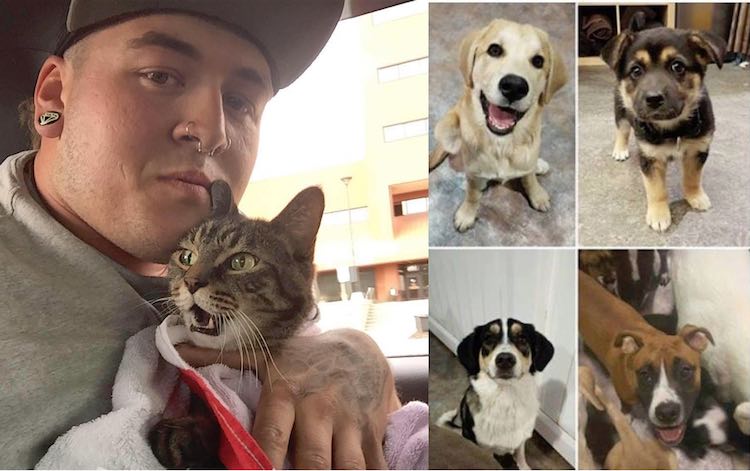Volunteers Go ‘Rogue’, Ignore Police Lines to Rescue Pets Stranded in Fire Zone
When a fast-moving wildfire stranded dozens of pets behind fire lines, a group of Canadian truck hobbyists kicked their compassion into high-gear, and slipped through barriers to rescue as many animals as they could before police forced them out of the area.
The massive Fort McMurray fire hit the Canadian town so quickly, some people couldn’t get home in time to pick up their pets. The evacuation order came suddenly and many people rushed home from work or shopping to find police had already cordoned off whole neighborhoods and weren’t letting anyone in because of the rapid movement of the fire.
Hundreds were forced to leave town with just the clothes on their backs.
That’s when members of Western Canadian Powerstrokes — who describe themselves as “truck enthusiasts who do charity work” — decided to help.
They’d gotten into the evacuated city as volunteers–to refuel trucks and equipment used to fight the fire–but were then told to wait because it was too dangerous along the fire lines. While they were waiting for orders, they heard about all the pets that had been left behind.
“It was a spur of the moment thing,” Wyatt Colquhoun-Rivard told CBC News. “And we just decided not to sit around anymore. We said ‘Let’s go save some pets…’ We went rogue.”
The men broke down doors in an apartment building as smoke alarms screamed non-stop. Inside, they rescued about a half-dozen animals that had been trapped for two days.
Colquhoun-Rivard (pictured above with his first rescue, Zion) posted pictures to Facebook and were swamped with requests to rescue other pets.
The Powerstrokes then picked up five dogs and three cats belonging to Trina Holloway. They called her on the phone hoping her voice would coax her most frightened dog out from under the furniture where he was hiding.
After police shut down their animal search-and-rescue operation, Holloway’s dogs were put on a plane to Edmonton to be reunited with their family.
The Powerstrokes have inspired dozens of other animal rescue groups to form. Volunteers from across Alberta have loaded up trucks and trailers and raced to the scene to round up stray pets and reunite them with their families.
They’re using social media — posting pictures of the animals they find and asking people to post pictures of their pets and addresses where they had to be left behind.
People who can’t go to Fort McMurray are sending donations to help. The Humane Society in Edmonton has been flooded with pet food donations. They bundling it up for shipment to evacuation centers around the fire zone.
There’s a website set up to report the locations of pets that need rescue, and also report the good news about animals recovered so far. While most of the requests are for dogs and cats, it also shows a diverse pet population in the community — one man even reported 32 geckos that need tending.
The massive Fort McMurray fire hit the Canadian town so quickly, some people couldn’t get home in time to pick up their pets. The evacuation order came suddenly and many people rushed home from work or shopping to find police had already cordoned off whole neighborhoods and weren’t letting anyone in because of the rapid movement of the fire.
Hundreds were forced to leave town with just the clothes on their backs.
That’s when members of Western Canadian Powerstrokes — who describe themselves as “truck enthusiasts who do charity work” — decided to help.
They’d gotten into the evacuated city as volunteers–to refuel trucks and equipment used to fight the fire–but were then told to wait because it was too dangerous along the fire lines. While they were waiting for orders, they heard about all the pets that had been left behind.
“It was a spur of the moment thing,” Wyatt Colquhoun-Rivard told CBC News. “And we just decided not to sit around anymore. We said ‘Let’s go save some pets…’ We went rogue.”
The men broke down doors in an apartment building as smoke alarms screamed non-stop. Inside, they rescued about a half-dozen animals that had been trapped for two days.
Colquhoun-Rivard (pictured above with his first rescue, Zion) posted pictures to Facebook and were swamped with requests to rescue other pets.
The Powerstrokes then picked up five dogs and three cats belonging to Trina Holloway. They called her on the phone hoping her voice would coax her most frightened dog out from under the furniture where he was hiding.
After police shut down their animal search-and-rescue operation, Holloway’s dogs were put on a plane to Edmonton to be reunited with their family.
The Powerstrokes have inspired dozens of other animal rescue groups to form. Volunteers from across Alberta have loaded up trucks and trailers and raced to the scene to round up stray pets and reunite them with their families.
They’re using social media — posting pictures of the animals they find and asking people to post pictures of their pets and addresses where they had to be left behind.
People who can’t go to Fort McMurray are sending donations to help. The Humane Society in Edmonton has been flooded with pet food donations. They bundling it up for shipment to evacuation centers around the fire zone.
There’s a website set up to report the locations of pets that need rescue, and also report the good news about animals recovered so far. While most of the requests are for dogs and cats, it also shows a diverse pet population in the community — one man even reported 32 geckos that need tending.

